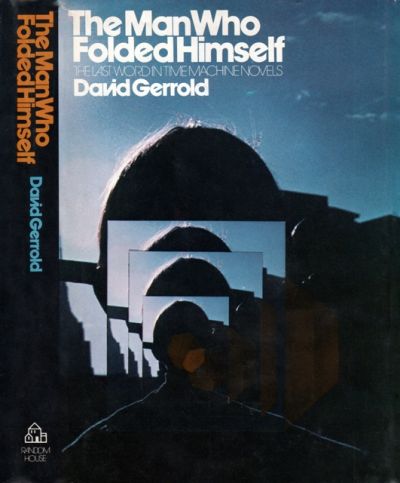You’re My Mirror
The Man Who Folded Himself
By David Gerrold

24 Dec, 2017
David Gerrold’s 1973 The Man Who Folded Himself is a standalone time-travel story.
Assured by his Uncle Jim that he will inherit a vast estate, Daniel Eakins is unpleasantly surprised to discover (after his uncle’s demise) that his legacy is not the hundred-million-plus dollars Daniel had expected. What he gets: the far smaller sum of six thousand dollars … and a belt.
It is a particularly fine belt. In fact, closer examination reveals that it is a fully functional time machine.
The belt comes with detailed, useful documentation. It’s not long before Daniel starts experimenting with the belt, which leads to another interesting discovery: time travel allows him to consult with his older selves. Older Dans give him invaluable advice, such as: it would be a bad idea to catch the attention of the authorities by too greedily exploiting his knowledge of the future.
The belt offers Daniel — and only Daniel — an unparalleled opportunity to explore his own potential. Editing history to suit his personal tastes, he embraces solipsistic hedonism; the mutability of history means that various versions of Daniel co-exist, mostly male, a few female, all rather self-focused. Some of them are victims of Daniel’s own weaknesses, as amplified by the belt.
Daniel controls history. What he cannot control is his personal passage through time. Every version of himself ages. Every version is ultimately doomed. In the end, Daniel’s greatest challenge will be facing that inescapable truth.
~oOo~
There’s a fair amount of gay sex in this. These days one would have to be a sad puppy indeed to object. However, I did find myself curious as to how book reviewers back in the Disco Era reacted to that aspect of the novel but I’m not going to do the research. But … no time, no energy. I’m not going to do the research.
At one point Daniel considers himself gay (well, “homosexual” because this was written in 1973 and the vernacular was slightly different) because his preferred sex partners are generally male. As risky as it is to assess a character’s sexual orientation without consulting that character, I think the text supports a different interpretation. Daniel (or versions of Daniel) also has enthusiastic sex with certain women. The men and women Daniel lusts after share a single quality: they are all variants of Daniel himself. Daniel isn’t straight, gay, or bisexual so much as he is incredibly self-absorbed.
Daniel’s self-absorption and laziness limit the scope of the novel. He is unwilling to learn new languages, so he cannot explore many other times (as does There Will Be Time’s Jack Havig). This is good, because not only does it give the novel a clear period on which to focus, it limits the damage that Daniel can do. To quote the novel:
Just as a time-travelling Daniel Eakins keeps evolving toward a more and more inevitable version of himself, then so does the world he creates. It’s a pretty stable world, especially in the years between 1950 and 2020. Every so often it needs a “dusting and cleaning” to keep it that way, but it’s a pretty good world. Just as I keep excising those of me which tend to extremes, so am I excising those worlds which do not suit me. I experiment, but I always come back.
I guess I’m basically a very conservative person.
Daniel edits his worlds to suit himself. He just plain does not care about others.
These people aren’t real to me. They’re pieces on the playing board.
There’s an implied dystopia here. No events that would personally inconvenience Daniel will be allowed to happen. There’s no evidence that women’s liberation and feminism exist in his preferred history. There’s no mention of the civil rights movement. I imagine Daniel as creating a cozy, Daniel-centric world which may nevertheless be hell for other people.
Gerrold being the Heinlein fan that he is, I would not be surprised if one of the inspirations for his short novel was Heinlein’s paean to time-travel-facilitated solipsism, “All You Zombies…” Indeed, Daniel manages to take the central conceit even further than did “All You Zombies’”. It’s a very Me Generation sort of dystopia: self-discovery for the protagonist with no regard for the costs inflicted on those with the poor taste not to be Daniel. It’s an examination of how easy it is for power to turn someone into a monster.
The Man Who Folded Himself is available here (Amazon) and here (Chapters-Indigo).
